May 2009
May 2009 sadmin'Let us learn' campaign exceeds targets
'Let us learn' campaign exceeds targets sadminThe Kha Ri Gude (Let us learn) mass literacy campaign has made huge progress since it started last year. The campaign has exceeded its targets 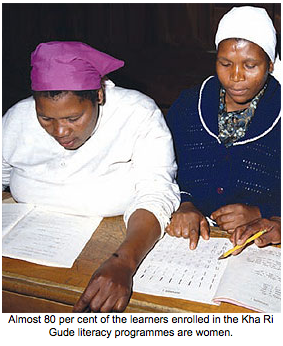 in almost all provinces - especially in KwaZulu-Natal, the Eastern Cape and Limpopo. The campaign, which was rolled out as a pilot in 2008, enrolled 360 000 learners countrywide. Nearly 80 per cent of the learners enrolled are women and 65 per cent of the volunteer educators are younger than 35 years.
in almost all provinces - especially in KwaZulu-Natal, the Eastern Cape and Limpopo. The campaign, which was rolled out as a pilot in 2008, enrolled 360 000 learners countrywide. Nearly 80 per cent of the learners enrolled are women and 65 per cent of the volunteer educators are younger than 35 years.
Government has set aside R6,1 billion for the campaign over the next five years to enable 4,7 million South Africans to achieve literacy by 2012. The campaign has made an important contribution to promote literacy among communities. It has made use of structures like traditional leaders, councillors, faith-based organisations, community organisations dealing with the disabled and the aged. Through the campaign, volunteers from poor communities are provided with jobs which help to reduce poverty.
- BuaNews
A GOVERNMENT FOR ALL SOUTH AFRICANS
A GOVERNMENT FOR ALL SOUTH AFRICANS sadminThe inauguration of President Jacob Gedleyihlekisa Zuma ushers in South Africa's fourth democratically elected government. It is poised to serve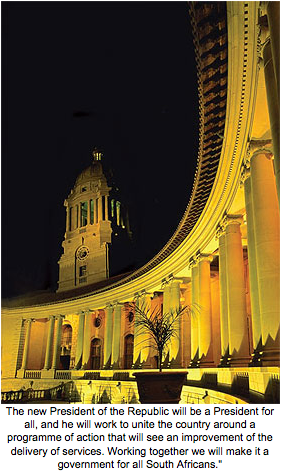 the nation by implementing a mandate won in an election that was strongly contested with strong participation across South African society.
the nation by implementing a mandate won in an election that was strongly contested with strong participation across South African society.
New resolve
significant challenges, but a country that can also take pride in what it has achieved since the attainment of democracy. When the Independent Electoral Commission confirmed the results of the election, Jacob Zuma, acknowledged the responsibilities placed on his shoulders as the leader of the ANC. He called for a new resolve based on selflessness and commitment to accelerate transformation and improve the quality of life of all South Africans.
"We are very grateful and humbled by the decisive mandate we have received from millions of South Africans.... They were attracted by our policies and the delivery of service in the past 15 years, as a well as the track record of this movement in working to build a better South Africa since 1912.
"We do not take the mandate lightly. We know the responsibility that comes with it. The new President of the Republic will be a President for all, and he will work to unite the country around a programme of action that will see an improvement of the delivery of services. Working together we will make it a government for all South Africans." - 25 April 2009.
Unite the nation
In the past 15 years, much has been achieved to unite the nation, improve social and economic conditions, and enable South Africa to play its part on the international stage. Internationally, South Africa has established itself as a country helping to represent the interests of the developing world, and as a campaigner for a more equitable system of international governance.
Nevertheless there is more to be done. Our shared goals for development and equity will still take time to achieve in full. New challenges have arisen, not least from the world's economic crisis.
Against this backdrop, President Zuma will lead a dedicated team of government leaders. They are mandated to work together with all sectors of society to implement programmes that prioritise economic growth and job creation; rural development; education; a better functioning health system; and intensify the fight against poverty and crime.
Better life for all
This administration will ensure that South Africa continues to pursue an equitable system of international governance that favours regional and continental integration and development.
Collectively, members of the new government have spent most of their lives immersed first in the struggle for freedom, then in the building of a free, non-racial and non-sexist democratic South Africa. They are guided by a constitution that respects the human rights of all, building on 15 years of a democratic government committed to create a better life for all.
In the five years ahead, Mr Zuma will lead a team that combines experience with new energy. In the context of a renewed mandate, they will continue uniting the nation and transforming the inequalities embedded over many years of colonialism and apartheid.
BE ON THE SAFE SIDE, PAY YOUR DEBT
BE ON THE SAFE SIDE, PAY YOUR DEBT sadminManaging your money
South Africa, like many other countries in the world, is experiencing economic problems. This is causing some people to lose their jobs and the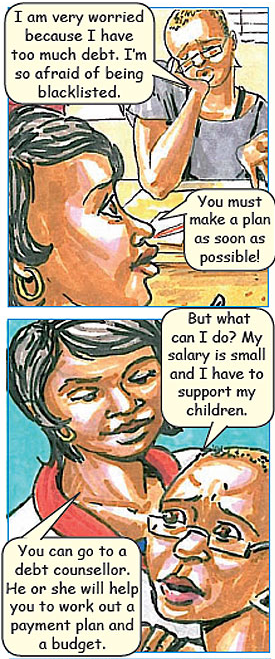 price of basic needs like food to rise. The people who are likely to be affected the most are those who are already in serious debt.
price of basic needs like food to rise. The people who are likely to be affected the most are those who are already in serious debt.
National Credit Act
To prevent people from falling into the debt trap, government has put in place certain measures. The National Credit Act protects consumers by preventing credit-givers from lending money to people who cannot afford to pay it back.
Government put into practice the National Credit Act to make sure that consumers stay informed of their credit status and do not fall into debt that they cannot afford to pay back. Government did this because it believes that an informed consumer is a protected consumer.
A lot of South Africans have borrowed more money than they can afford. They are now unable to make regular payments and get deeper into debt or are blacklisted. Many of them believe that they will never be debt free. But there is hope.
Debt counsellor
Vuk'uzenzele spoke to Fatima Davids, a divorced single mother. She has to support her children on her small salary. Vuk'uzenzele asked her how she managed to recover from huge debt.
Davids' financial problems started when she divorced her husband. During the divorce she spent a lot of money on legal fees. This left her with a lot of debt. She was unable to pay off her debt and support her children as well.
She was so desperate that she contacted the Credit Ombud. He referred her to a debt counsellor to help her get out of debt.
Budget plan
The debt counsellor helped her by first working out a budget plan. The counsellor also talked to all her credit givers to work out a payment plan for her. "I had to follow the payment plan strictly," she said. The counsellor advised her to pay up the small debts first and then the large ones.
Davids was protected from getting into further debt through the National Credit Act. This was in line with the Act, which states creditors are not allowed to lend her any money until she paid off all her  debt.
debt.
For example, a person who buys a car on credit and does not earn enough to pay this debt is the kind of person protected by the Act.
Be careful
Her advice to people who have fallen into the debt trap is to be very careful. "You should seek help and pay your debts in time to avoid interest charges that worsen the debt", she said.
The best way to be debt free is not to ignore your debt. Admit that you have a problem and make a plan as soon as possible. Be on the safe side, pay your debt.
- Carol Netshifhefhe
BEATING DISABILITY WITH COURAGE
BEATING DISABILITY WITH COURAGE sadminMuzi Pooe was born without hands. He has only one leg, which is deformed. But his disability has not stopped him from following his dreams of 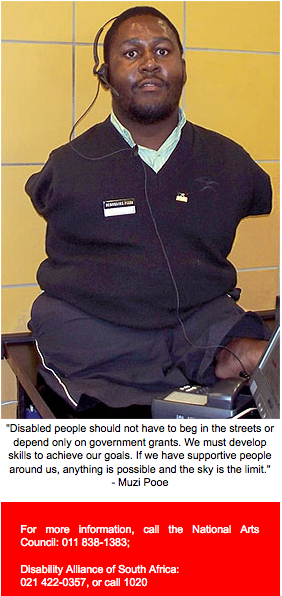 becoming a singer and a businessman.
becoming a singer and a businessman.
Being disabled should never be an excuse to give up on your dreams, says Muzi Pooe. This 23-year old from Elspark, Germiston, uses his malformed left leg to write and drive his wheelchair. This is the only limb he can use.
Pooe is now learning to be a cashier at a pizza restaurant in Elspark. He uses his toes to work the till.
Singing
Since childhood, Pooe sang in the church choir. After finishing Grade 10 at a special school for disabled children, he became a gospel singer. He is now well-known in the Ekurhuleni area.
He also sings afro-pop with a band and has performed at many events organised by government. Last year, he was part of a group who sang at a farewell function for the Paralympics team before they left for Beijing, China.
The Department of Arts and Culture's National Arts Council has helped Pooe's music career to grow. "My singing career would never be where it is if I didn't get help from them," Pooe said.
Own business
"I have also worked with the Disability Alliance of South Africa where I was involved in their skills development programmes for disabled people,"
As a learner cashier, Pooe is slowly learning the pizza restaurant business. He especially enjoys the contact with customers.
"I have already talked to the head office of the restaurant and asked them for information to start my own pizza restaurant," he said.
"I am saving money so that I can go to the Umsobomvu Youth Fund for help. I hope to get half of the money I will need to apply for a franchise business of my own."
Disappointment
A disappointment led to Pooe's interest in starting his own pizza restaurant.
"In 2007, I had high hopes to get a break into the music industry after being on a popular TV show. But things didn't turn out the way I wanted," he said. He was very disappointed and became so depressed that he just stayed at home doing nothing.
Pooe's brother, Thando, wanted to help him and asked the Du Preez family who own the pizza restaurant where he worked, to give him some time off to look after Pooe. But instead they told Thando to bring his brother to the shop to learn to be a cashier.
They started training him and bought special equipment to make his job easier. "Since I have been there, I have overcome my fears and I'm positive about my future." Pooe said.
- Mbulelo Baloyi
BRT - CHANGING THE FACE OF PUBLIC TRANSPORT
BRT - CHANGING THE FACE OF PUBLIC TRANSPORT sadminMost people who work in South Africa's cities know that the traffic during peak hours is a big problem. One of the main reasons for too many 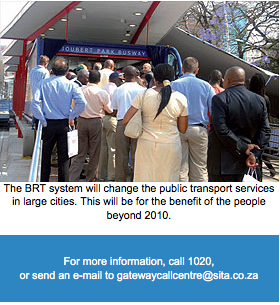 cars in our cities is that a lot of people prefer to use their cars to go to work rather than public transport.
cars in our cities is that a lot of people prefer to use their cars to go to work rather than public transport.
The main reason why more people use their own cars to go to work is because public transport, like trains and buses, are not always reliable or accessible.
This leads to too many cars in the cities, which cause problems like traffic jams and accidents. The result is a loss of productivity, because people are late for work. Too much traffic also damages the environment. This is because the exhaust fumes cause air pollution.
Reduce traffic
Government has set out to change the public transport system in major cities to reduce traffic and provide a reliable and accessible service. This is in line with promises made to FIFA when South Africa was given the right to host the 2010 World Cup.
To reduce the number of vehicles during peak times, the municipalities of Johannesburg, Cape Town, Port Elizabeth, Tshwane and eThekwini (Durban) are putting plans in place for the Bus Rapid Transit (BRT) system.
Linked services
BRT is a mass public transport system. It is similar to trains, but is road-based. Presently a lot of passengers have to travel to the central parts of cities and then travel to their final destinations from there. With a BRT system, these people will no longer have to travel through the city to reach their final destinations.
The Rea Vaya BRT in Johannesburg, which is expected to start working in June, will offer three linked services. The largest buses, which can carry up to 90 passengers, will travel only on the specially made bus lanes on the main routes.
Buses, which can carry 60 passengers, will pick up passengers at stations on the main routes. They will also have special bus lanes.
Medium-sized buses, which can carry 32 passengers, will bring people from the outer areas where there is no direct access to the main routes.
Brazil
The BRT buses will run between five o'clock in the morning and midnight. They will operate every three minutes during peak traffic periods in the mornings and afternoons. During less busy periods, they will be available every ten minutes.
The BRT plans have been copied from countries with similar public transport problems. These are Brazil and Colombia in South America where the BRT system is working successfully.
- Mbulelo Baloyi
DAIRY HELPED THEM BEAT POVERTY AND UNEMPLOYMENT
DAIRY HELPED THEM BEAT POVERTY AND UNEMPLOYMENT sadminA group of five people from the small farming community of Jagersfontein did not allow poverty and unemployment to get them down. It only 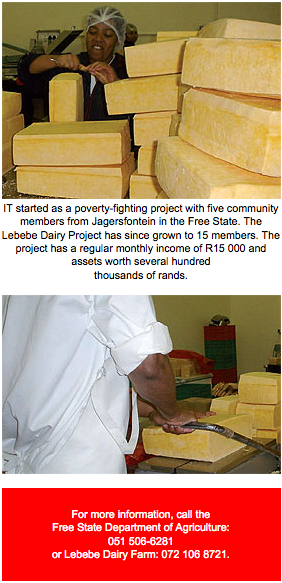 made them more determined to succeed.
made them more determined to succeed.
They started the Lebebe Dairy Project in 1990 to create jobs for local unemployed people. The group has now grown to include 13 women and two men.
Land
In 1994, the Kopanong Local Municipality gave them 708 hectares of land for small-scale farming. They decided to use the land to grow vegetables to sell in the area.
"The money we made was used to open a savings account," said project manager, Mzamo Phatla. Phatla lost his job because the gold mine where he worked closed down. This forced him to find another way of supporting his family.
Equipment
When the project started growing, the group asked for help from the Free State Department of Agriculture. The Department advised them to start a dairy farm.
"We then asked for help from the Department of Social Development. Through its agency, the National Development Agency (NDA), the department gave us R3 million to start a dairy farming business," Phatla said.
They used the money to buy dairy-farming equipment like machines for milking cows. They also bought a medium-sized truck and a tractor.
Products
Today, the Lebebe Dairy Project has 80 dairy cows which give 250 litres of milk daily. The products they sell include fresh milk, sour milk and yoghurt, as well as cheese and ice lollies.
The products are sold in Jagersfontein, Trompsburg, and Fauresmith. Project members have also signed a contract with the local Olien High School in Jagersfontein to supply milk to the school. Each of the 15 project members get a monthly allowance of R500.
Mentoring
When they started the project, an absence of skills was a problem Phatla said. "For example, most of our members did not get any formal schooling. But the Department of Agriculture has helped us by giving us an advisory officer to mentor project members."
They have also attended skills development courses and training programmes funded by the Department of Labour.
This has helped them a lot to run their project as a farming business. Training included tractor maintenance, first aid, operating milking machines, caring for milk stud cattle, book-keeping, small business management and marketing management.
- Mbulelo Baloyi
ECONOMICS: FACTS & FUN...
ECONOMICS: FACTS & FUN... sadminPLEASE NOTE:
The games on this page is not a competition. They are only for fun, so don't send your answers to Vuk'uzenzele.
What is the economy?
The economy is about money and about working and doing business to earn money. It is also about how we manage and use the money we earn. This involves buying, selling, lending, saving and growing our money.
What is an economic crisis?
The world-wide economic crisis, or economic slowdown, started when governments allowed their banks and other financial institutions to lend out more money than they could afford. As a result, they got too deep into debt. They also gave too much credit to clients who could not afford to pay it back. So their clients also got too deep into debt. This means there is less buying, selling and lending. The economic crisis is leading to people losing their jobs.
Find the hidden Words
The words given below are hidden in the grid. See if you can find them, then circle them like the word "JOB". They can go from top to bottom, down or across or diagonally. The words are: WORLD, ECONOMY, MONEY, LEND, BORROW, SPEND, BUY, SELL.
Print the image below to complete this game...
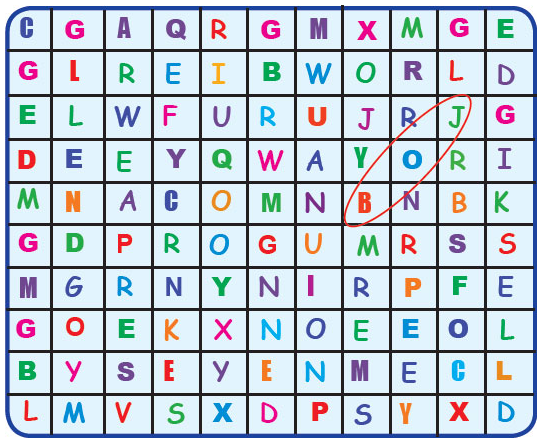
Fill in the Missing Words
Read about the economy on this page, as well as here and here and answer the questions below.
Print the image below to complete this game...
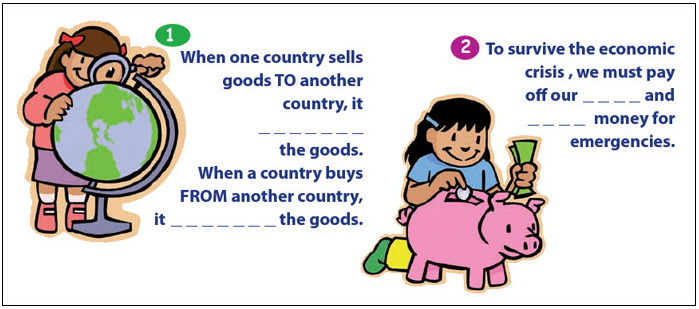
CLICK HERE FOR THE ANSWERS
Unscramble the Words
The scrambled words below can be found on this page. Try to unscramble them and write your answers on the lines next to the circles.
Print the image below to complete this game...
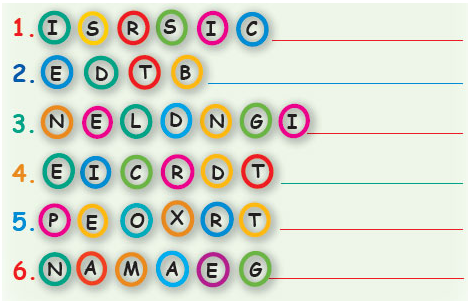
CLICK HERE FOR THE ANSWERS
ENJOY WITH AWARENESS: WHAT SOCCER FANS SHOULD KNOW
ENJOY WITH AWARENESS: WHAT SOCCER FANS SHOULD KNOW sadminThe 2009 FIFA Confederations and 2010 FIFA World Cup are the two biggest soccer events ever to be hosted by South Africa. Both events are 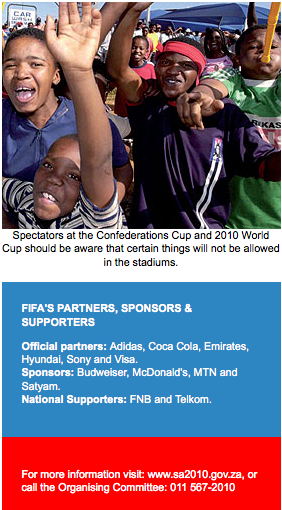 expected to attract millions of soccer fans from around the world. For these events to take place successfully, FIFA has official partners, sponsors and national supporters. They provide funding to make these tournaments possible. They want fans to enjoy the games, but to protect their interests, they have made certain agreements with FIFA.
expected to attract millions of soccer fans from around the world. For these events to take place successfully, FIFA has official partners, sponsors and national supporters. They provide funding to make these tournaments possible. They want fans to enjoy the games, but to protect their interests, they have made certain agreements with FIFA.
It is important for soccer fans to know who the official sponsors, partners and national supporters are. This will help them to understand what is expected of them when they watch the games at the stadium.
FIFA logo
The partners, sponsors and national supporters of FIFA are the only advertisers allowed to claim any direct association with the tournament.
This means that other companies or small businesses cannot use the FIFA logo or phrases to market their products during the tournament.
Not allowed
The Confederations Cup and FIFA World Cup are protected events. This means that soccer fans will not be allowed to have or do certain things when they attend matches.
This is done for safety reasons and to protect the interests of the partners, sponsors and national supporters. It is in line with agreements made to them by the Organising Committee.
Clothing
Spectators will not be allowed to enter the stadium if they are wearing clothing showing advertising other than that of the sponsors. Such clothing may also not be handed out in large numbers before the match to attract the attention of the masses. Only the names, emblems and slogans of the official FIFA partners will be allowed on clothing.
People wearing clothing carrying racist, political or religious messages, which can cause any negative reactions will not be allowed in the stadium.
Banners
Carrying banners showing racist, religious or political messages will not be allowed. If soccer fans do this when they are already in the stadium, the match officials have the authority to make them leave the stadium immediately.
Weapons
Weapons or objects like glass or plastic bottles, cans or other small containers that may put people's lives in danger will also not be allowed in the stadiums.
For the safe enjoyment of everyone attending matches, people that are drunk will be banned from entering the stadiums.
- Carol Netshifhefhe
FROM CATCHING CRIMINALS TO FARMING VEGETABLES
FROM CATCHING CRIMINALS TO FARMING VEGETABLES sadminIt has been a long and difficult road to success for Jacob Smith. After 20 years in the police service, he started growing vegetables on a small 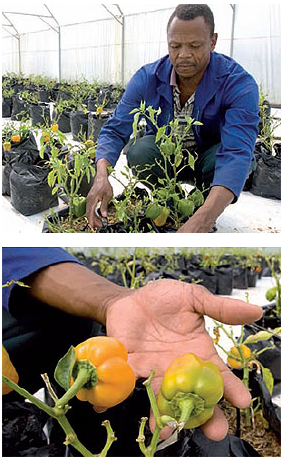 patch of land. With the help of the Department of Land Affairs, he now owns land and supplies vegetables to restaurants and the Johannesburg Fresh Produce Market.
patch of land. With the help of the Department of Land Affairs, he now owns land and supplies vegetables to restaurants and the Johannesburg Fresh Produce Market.
For 20 years, Jacob Smith worked under dangerous circumstances chasing criminals and bringing them to book. But when this 48-year old man from Rietfontein in the Vaal area of Gauteng, realised he wasn't going to be promoted beyond the rank of a sergeant, he quit his job.
He started doing small jobs to support his family. But without a regular income he soon found himself in debt.
Passion for farming
"I always had a passion for vegetable farming," he said. "So I started growing vegetables like spinach and tomatoes on a small piece of land in my backyard to sell to my neighbours."
His business started growing and he was supplying street vendors in Rietfontein and other areas in the Vaal. But because of the shortage of space he couldn't keep up with the demand.
"My wife, Evelyn, was helping me. She suggested I ask government for funds to grow my business," Smith said.
Training
After talking to the Department of Land Affairs, they helped him to get a 58-hectare plot of land. "The department also helped me to do a basic training course in vegetable farming," he said. "The course helped me a lot as it introduced me to modern methods of growing vegetables in an urban area."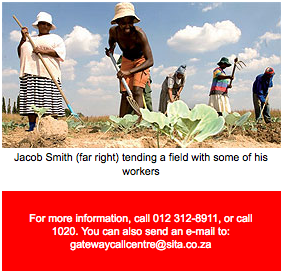
Production
After completing his training, Smith got help from government to build hydroponic tunnels. Hydroponic farming is a method of growing plants, especially vegetables, in water containing essential nutrients rather than in soil. This is done in big plastic tunnels.
Smith uses the hydroponic tunnels to grow vegetables like cucumber, tomatoes, green pepper, spinach and parsley.
"The tunnels have made it easier for me to improve my production," he said. "It protects the crops from risks like pests and too much sunlight."
Smith now provides jobs to six permanent workers on his farm. During harvesting and weeding seasons, he employs more than 20 casual staff to help him and his permanent staff.
2010 World Cup
"My business is growing and I am now supplying many restaurants in the Vaal area, as well as in Johannesburg. I also take some of my produce to the Johannesburg Fresh Produce Market at City Deep," Smith said.
He believes the demand for fresh produce will increase with the Confederations Cup this year and the World Cup in 2010. "Many people from all over the world will be visiting our country, which will bring in more money," he said.
- Mbulelo Baloyi
GIVE US A PIECE OF YOUR MIND
GIVE US A PIECE OF YOUR MIND sadminWINNING LETTER
There are different things that can help us succeed in life. You don't have to be rich or belong to a family that has lots of money to be successful.  You don't need to attend a fancy school. You can become educated even if your classroom is in the shadow of a tree. Any school is better than no school. All it takes is hard work, commitment, creativity, ability, responsibility and willingness.
You don't need to attend a fancy school. You can become educated even if your classroom is in the shadow of a tree. Any school is better than no school. All it takes is hard work, commitment, creativity, ability, responsibility and willingness.
As South Africa's teenagers, we must start to dream big and forget about all the wrong things in this world, because they are going nowhere. We, as the country's youth must not forget that we are the leaders of tomorrow. We must love South Africa and constantly strive to make it a better place for all. We must be mindful of our past, be proud of our heritage and focus on our future.
- Nonoho Monyatsi, Vryburg, North West
Don't write off the elderly
I want to tell you a remarkable story about an elderly woman who was almost 80 years old. About a year ago she joined an adult learning programme.
She was very curious and anxious to learn to read and write. She attended the classes on a regular basis without absence and did very well. After her 80th birthday, which she celebrated with her family and friends, she became ill and died.
On the day of the funeral her teacher said in a tribute to her, the only desire she had before she died was to read her own Bible and write her name. The message is: don't write off our elderly persons. Give them a chance because they are not too old to learn. They are wiser than we are and have information that we can use on our road to success.
- Lesley Ruiters, George, Western Cape
Disabled, but capable
Disabled people are faced with challenges and very difficult situations, especially at school and in their communities. Talking from experience, I can say that we are often treated differently from those who are physically strong. But just because I have some part of my body that is not physically fit does not mean that I am mentally ill.
People should remember that even though we are disabled, we are capable of doing things ourselves
- Hlengiwe Fathima Ngobese, Inanda Newtown, KwaZulu-Natal
Free education
A very important thing government is doing for us is giving us free education. But many people don't use this opportunity. I am a young person who has completed my Diploma in Electrical Engineering and I'm grateful for free education.
I live in a small township where there are no jobs. I always get worried about this township because lots of young people leave school. They often end up becoming the victims of alcohol, drugs and crime. Young people should understand that "an empty mind works for the devil." They need to use this opportunity of free education and go to school.
- MT Nkaota, Steynsrus, Free State
Let's take responsibility
All parents wish to pay school fees to help their children get an education. However, recent statistics show that 75 per cent of the books in libraries are never taken out.
So this is a call to the youth to take responsibility for their own studies. They should not blame their parents when they fail at school; they should blame themselves.
To the youth of the African continent let us take responsibility! Let us work hard at our studies so that we can uplift the economy of the whole continent
- WJ Thubane, Babethu, Mpumalanga
Realise the importance of school
In South Africa, there are government schools and job opportunities available every year. So it amazes me that every year the number of school drop-outs rises.
What is happening to our youth? What is happening to our parents? Many parents don't bother about their children's education and success. They expect government to provide their children with free transport, food, and no school fees. Parents must take responsibility and these school drop-outs must realise the importance of school.
- Sfiso Jerry Nhlabathi, Dundonald, Mpumalanga
You have changed our lives
Vuk'uzenzele is the best thing ever that happened under the sun and I feel that it has to be praised. It has changed our lives and made us even proud to be South Africans. Vuk'uzenzele helped thousands of jobless people to put bread on their tables by introducing the opportunities that government is offering. It has made it possible for boys and girls to further their studies at FET colleges and universities by telling us about bursaries and loan schemes. Small businessmen are growing stronger because the magazine introduced the agencies that provide training and that financially help to strengthen their business.
- Johanna Mathiane, Ga-Mushi Village, Limpopo
I'm no longer a naughty boy
I am a 21 year old boy living in a rural area where people my age are committing crime, doing drugs and taking alcohol. I was also like that. But now I have changed by just reading this magazine. I would like to encourage young people to read this magazine because it is informative. I thank Vuk'uzenzele magazine that I am no longer a naughty boy.
- Malose Kgosana, Mokopane, Limpopo
Just be yourself
Growing up can be one of the most stressful adventures in life. The changes we go through are sometimes tough, especially when we enter adolescence. We become exposed to peer pressure that can bring us down, because we want to 'fit in'.
A lot of teens are now regretting the path they took because of peer pressure. Some have become school drop-outs or drug addicts. Others are now HIV positive or pregnant because they could not stand for what they believed in.
Just be yourself, follow your dreams and goals no matter what the next person thinks
- Robert Mokone, Tafelkop, Limpopo
Think long-term
Just because you don't work in an office or report to a manager does not mean you should not take your work seriously. Don't rely on conversations in the taxi to make your name known. Carefully decide what methods you will use to promote your services. Know how much money you can afford to spend on marketing. See the different jobs that you do for different clients as one connected project. This will allow you to think long-term instead of short-term.
Knowing your industry and what you can charge will show that you have the necessary and relevant knowledge of your business.
- Fhulufhelo Mulaudzi, Dzanani, Limpopo

KEEPING IT BRIEF
KEEPING IT BRIEF sadminEASTERN CAPE & NORTH WEST
A partnership between the Department of Education and cellphone network operator, Vodacom, has helped to build three schools in the Eastern Cape and North West provinces. An amount of R15 million was set aside for the project. Two schools, Kamogelo Primary School in Migdol and Freedom Park Secondary, were built in Rustenburg and handed over to the North West Education Department. In the Eastern Cape, the provincial education department contributed half of the cost to build the Zithulele Senior Primary School at Zimbane Village outside Mthatha.
- Dept of Education
FREE STATE
The province's Department of Health received R110 million from the provincial Treasury. This will help the department to address the challenges faced by its hospitals and clinics. With the current budget the province will be able to provide ARVs to 44 000 people.
- BuaNews
WESTERN CAPE
A water project which can save between 15 and 35 per cent of a school's water bill is to be extended to ten more schools in Mitchell's Plain and Khayelitsha near Cape Town. The project forms part of the department's overall programme to help the province reduce waste and use energy and water more efficiently.
- BuaNews
LIMPOPO
New schools with modern facilities have been opened in three municipalities in the province. They are the Nthame Primary School in Burgersfort, Fetakgomo High School in the Fetakgomo Municipality and Sekabate Primary School in the Tubatse Municipality. In the past, children had to attend classes in shacks, which made teaching very difficult. The schools were built in partnership with the Education Department and the Independent Development Trust at a cost of more than R100 million.
- BuaNews
KWAZULU-NATAL
Over 400 high schools in the province's poorest areas will soon be able to provide meals to their learners through government's nutrition programme. The provincial education department put aside R555 million for this purpose. The programme, which started in primary schools, is currently providing meals to 3 924 primary schools in the province. The department aims to provide meals to all poor schools in the province regardless of whether they are primary or secondary schools.
- BuaNews
MPUMALANGA
A new pipeline has been installed in the Vaal. It will ensure water delivery from the Vaal Dam to Eskom power stations and Sasol industries in Mpumalanga's highveld region. This will help solve the problem of electricity shortages in the province. The project created skills-development opportunities, as well as 1 685 jobs.
- BuaNews
LEAVING A LASTING LEGACY
LEAVING A LASTING LEGACY sadminDusty soccer fields for communities near the World Cup host cities will soon be a thing of the past. This is due to FIFA's World Cup legacy 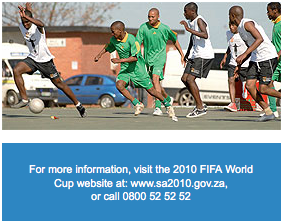 programme. A new stadium with an artificial soccer pitch will be built in Orange Farm near Johannesburg. This is only one of many similar projects that will leave a lasting legacy long after 2010.
programme. A new stadium with an artificial soccer pitch will be built in Orange Farm near Johannesburg. This is only one of many similar projects that will leave a lasting legacy long after 2010.
The Orange Farm stadium forms part of FIFA's legacy programme. This programme highlights the first ever World Cup on African soil.
It aims to develop and promote grassroots soccer in Africa. The legacy programme is also part of a bigger FIFA plan to help build a new generation of soccer players.
Thirty artificial pitches have already been completed in other African countries.
African soil
The rebuilt Orange Farm stadium boasts change rooms, training lights and security fencing. It will also get a clubhouse and an office to be used by the local football community.
A total of 27 similar pitches, three in every province, are planned for townships and rural areas. They are all part of the 2010 World Cup legacy programme and the National Lotteries Trust Fund.
So far, the first nine pitches have been approved.
Training
Last year, the 2010 Organising Committee opened one of these football pitches in South Africa in KwaZulu-Natal. The Wadley Stadium in Edendale Township near Pietermaritzburg is one of the pitches to be used for training purposes during the 2010 World Cup.
First National Bank, one of the sponsors for the FIFA 2010 World Cup, donated funds to rebuild the Wadley Stadium and the artificial pitch.
Youth
The artificial pitches in all the provinces will be aimed at serving the youth. They will be located next to schools or public institutions and will form part of a three-year programme.
Organising Committee Chief Executive, Dr Danny Jordaan, said the artificial pitches would play an important role in improving and promoting soccer development in rural areas.
Host stadiums
Other projects besides the artificial pitches, will also leave a lasting legacy after the 2010 World Cup is over.
These include the 2010 host stadiums as one of the biggest legacies of the tournament. All these stadiums comply with FIFA regulations.
It is the first time in South Africa's history that new soccer stadiums are built for soccer only instead of for soccer and rugby.
Training stadiums like the Rand Stadium and Orlando Stadium in Johannesburg will also contribute to the development of football in the country.
- Mbulelo Baloyi
PRESIDENT ZUMA'S LIFE
PRESIDENT ZUMA'S LIFE sadminAs a leader, President Zuma reflects the resilience of his origins and persistent successes against the odds. Born in the impoverished rural hinterlands and raised by a single parent after the death of his father when he was only five years old, he grew up under the guardianship of his 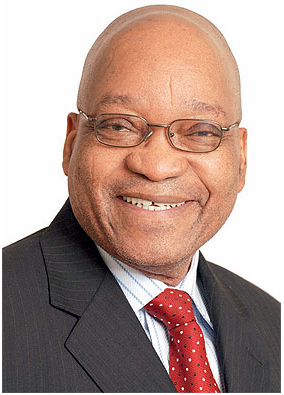 grandparents. Like the rest of his peers, he had to herd cattle and fight with sticks. His circumstances prevented him from attending school.
grandparents. Like the rest of his peers, he had to herd cattle and fight with sticks. His circumstances prevented him from attending school.
At the age of 17 he moved to Durban to take up employment. Given his life experience of poverty and exposure to oppression, he identified the need to fight the oppressive system of apartheid and joined the ANC in 1959.
Joining MK
He left the country in 1975 and spent 12 years in exile. He operated at the reception points in Swaziland and Mozambique for young people going into exile after 1976. He was appointed to the National Executive Committee of the ANC in 1977. He served both as deputy Chief Representative and later Chief Representative of the ANC in Mozambique.
In 1987, he moved to the ANC's Headquarters in Lusaka where he became Head of Underground Structures and later Chief of the Intelligence Department. He also served on the ANC's Political and Military Council in the mid-1980s.
Homecoming
After the unbanning of the liberation movements in 1990, President Jacob Zuma was among the first ANC leaders to return to the country in preparation for repatriation of exile combatants. He was involved in the first formal interaction between the National Party government and the ANC, which led to the Groote Schuur Minute in May 1990. This marked the beginning of formal negotiations.
President Zuma was subsequently elected Chairperson of the Southern Natal Region. He played a critical leadership role in resolving violence between ANC and IFP supporters in the province.
Deputy President
At the first internal conference of the ANC, President Zuma was elected Deputy Secretary General of the ANC. He served in the KwaZulu-Natal provincial government as MEC for Economic Affairs and Tourism. He was subsequently elected to the position of the National Chairperson of the ANC and provincial Chairperson in KwaZulu-Natal. In 1997 he was elected Deputy President of the ANC. On 18 June 1999, President Zuma was appointed Deputy President of South Africa.
ANC President
On 18 December 2007, he was elected President of the ANC in the elective conference in Polokwane. In this capacity, he led the party's 2009 fourth general democratic elections campaign. Under his stewardship and leadership, the party won a decisive majority and retained its leadership in governing South Africa.
Mr Jacob Zuma is the third democratically elected President of the Republic of South Africa. He was inaugurated on 9 May 2009.
SUCCESS STARTED WITH ONE-DAY OLD CHICKS
SUCCESS STARTED WITH ONE-DAY OLD CHICKS sadminPuleng Masheane and her two partners never thought that 11 years after buying a few one-day old chicks, their business would be a huge success.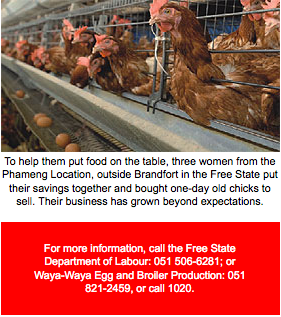
They started their business, Waya Waya Egg and Broiler Productions, in August 1998. "It grew so big that we are now 15 including 12 young people," Masheane said.
Land and funding
"Brandfort is very rural and there is not much going on in terms of business or manufacturing," she said. "So we decided that we had to do something ourselves to give us an income to support our families." They saw that there was a demand for cheap meat, especially chicken, and bought some day-old chicks.
To help them grow the business, the group went to the local municipality and the Free State Department of Agriculture for funding.
The municipality donated land and the Department of Agriculture funded the project with R1,2 million. The project has grown so big that it now supplies eggs to various big shops in Bloemfontein, as well as to the local community.
Skills training
The group also got help in the form of training in business skills from the Department of Labour. Training included broiler production, egg production and other skills relating to business development. "We are now able to talk to restaurants, bed and breakfast lodges and hotels to offer our products," Masheane said.
She said she was encouraged to see the involvement of young people in the project. She believes that this will make the business grow even more.
"I am also happy because there is a lot of skills transfer. Some of these young people may one day decide to start their own businesses. This would mean we would have achieved what we set out to do when we started this project," she said. Their main goal was to fight poverty while at the same time making money through getting the right skills.
World Cup
She said she was happy that the Free State Province and Bloemfontein in particular is one of the host cities for the 2010 World Cup.
"Thousands of soccer fans from around the world will be coming to watch soccer. They will stay at some of these hotels and lodges and they will have to eat breakfast. This is where Waya Waya comes in - anywhere in the world, eggs always form part of breakfast," said Masheane with a chuckle.
- Mbulelo Baloyi
SUPPORT FOR YOUTH
SUPPORT FOR YOUTH sadmin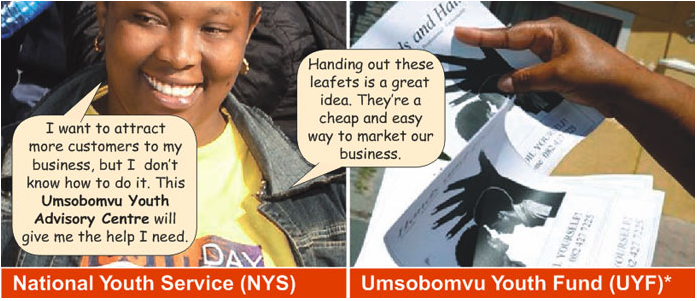
National Youth Service (NYS)
The National Youth Service is about involving young people in the development of our country. It is an opportunity for young people to actively serve their communities. The National Youth Service Programme aims to create a culture of service. It develops the skills, knowledge and abilities of young people. It also improves the chances of young people to get jobs by giving them opportunities to get work experience, developing their skills helping them to further their studies.
Umsobomvu Youth Fund (UYF)*
The Umsobomvu Youth Fund helps young people to start and grow their businesses by teaching them the necessary business skills. Umsobomvu has the following programmes:
- The Franchise Fund helps youth to start and run their businesses. Through loans and a voucher system, it aims to enable and empower young entrepreneurs to run their franchise businesses.
- Entrepreneurship Education Training: This training helps young people to understand entrepreneurship and business.
- Co-operative Training: Basic training for young people to help them set up and run youth co-operative businesses.
- Graduate Development Training: A training programme for unemployed graduates to improve their life and business skills.
- Business Consulting Services Voucher: Services designed to help youth start, grow or develop their businesses.
Umsobomvu Youth Advisory Centres (YACs) are walk-in centres around the country where youth can get information and support to find jobs or start their own businesses. YACs provide services to communities that are unable to get to the centres. It takes information about careers and skills development, as well as business advice to local schools in Mobile YACs.
Contact Umsobomvu: 08600 YOUTH (96884).
Umsobomvu Business Partnership: 011 470-3111. Website: www.youthportal.org.za
* PLEASE NOTE: In June this year, a new youth agency, the National Youth Development Agency (NYDA), will be formed when the National Youth Commission (NYC) and the Umsobomvu Youth Fund (UYF) join forces to become one organisation. The contact details will remain the same. (See this page for more information).
SUPPORT FOR WOMEN
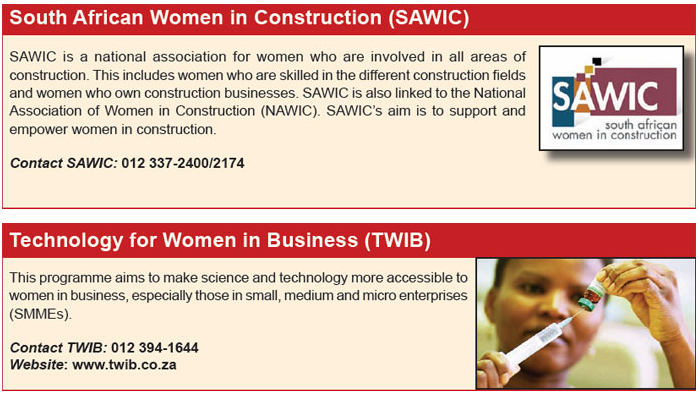
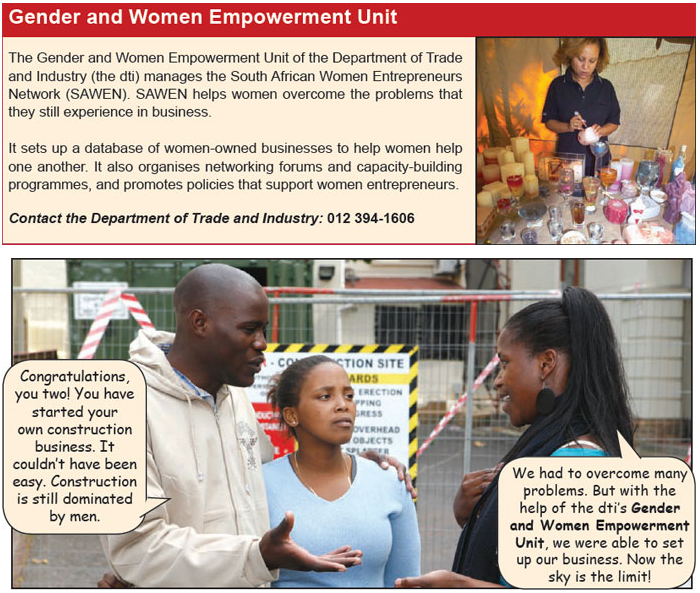
VOLUNTEERS WILL TRULY BE THE FACE OF THE TOURNAMENT
VOLUNTEERS WILL TRULY BE THE FACE OF THE TOURNAMENT sadmin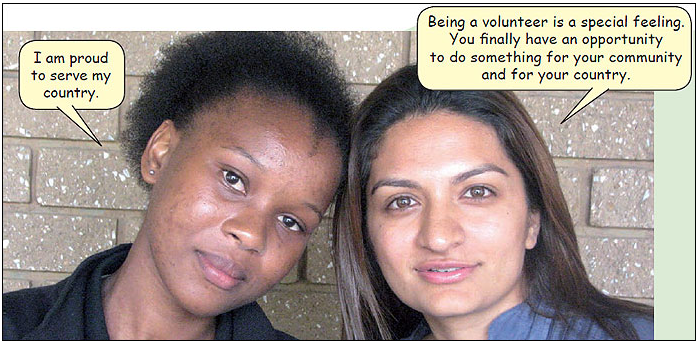
Thousands of eager, dedicated and proudly South African youths have been chosen as volunteers for the 2009 Confederations Cup. For Keoagile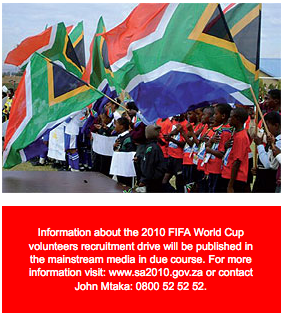 Moichela (left) and Shabnam Joosub (right) volunteering is more than just an opportunity to meet new people and make new friends.
Moichela (left) and Shabnam Joosub (right) volunteering is more than just an opportunity to meet new people and make new friends.
Shabnam Joosub (27) and Keoagile Moichela (21) from Johannesburg became friends on the first day of the volunteer training programme. They may not have much in common, but they are both passionate about their country and the African continent. Both want to help South Africa host one of the best FIFA Confederations Cups ever.
Do your best
Joosub is a full-time employee and MBA student in Johannesburg. She says it won't be an easy task to do her volunteer work and do other work as well, but she is up to it.
"When you do what you want to do, you do your best", she said. "My employer is allowing me to experience it because he feels that it will help me to develop as a person. I am taking two weeks off now for the training and I'll be taking more time during the tournament," she said.
A wonderful country
Joosub sees the opportunity to help South Africa host a successful tournament as a chance to interact with her community. She also wants to show the world that South Africa is a world-class country in Africa.
"Being a volunteer is a special feeling. You finally have an opportunity to do something for your community and for your country," she said. "We have such a wonderful country - I want to show the world that this is South Africa, a world-class place that they can come and enjoy."
Once-in-a-lifetime
Moichela, an unemployed youth from Johannesburg, believes that the opportunity to be a volunteer for the FIFA Confederations Cup will develop her skills, which will open doors for future employment opportunities.
"I am proud to serve my country," she said. "I love South Africa and when I heard that volunteers were being recruited I did not think twice. I knew that this was a once-in-a-lifetime opportunity to stand up and do something.
Develop skills
I am sure that through helping South Africa and the African continent host a successful tournament, I will be able to develop skills that will help me become employable in future," she said.
The way our young people responded to the volunteer programme is proof that South African youth are passionate about doing something for their country, Moichela said.
She believes the idea that South Africa's youth is carefree and clueless about what is happening in our country is not true. "I feel that the number of young people selected as volunteers is proof that when given a chance we do not disappoint," she said.
"I have no doubt that we will do our country proud by performing our volunteer duties to the best of our abilities."
Important event
The FIFA Confederations Cup has become an important event on the FIFA calendar. The 2009 tournament will feature South Africa and African champions Egypt, as well as the world champions Italy, European giants Spain, South American champions Brazil, Asian champions Iraq, CONCACAF champions United States and Oceania champions New Zealand.
Host cities
The tournament will be co-hosted by four South African cities. They are Johannesburg, Tshwane (Pretoria), Mangaung (Bloemfontein), and Rustenburg.
This will also be a chance for both fans and FIFA delegates to get a feeling for the stadiums which will be used for the 2010 World Cup.
The 2009 Confederations Cup will also be used to test South Africa's state of readiness to host the long-awaited 2010 World Cup.
Backbone of events
Volunteers have played an important role in helping South Africa host major events in the past. This includes the successful hosting of the preliminary for the 2010 FIFA World Cup and the 2009 FIFA Confederations Cup draws.
Manager of the Volunteer Programme, Onke Mjo, says volunteers will be the backbone of the FIFA events to be hosted in South Africa.
"These volunteers will truly be the face of the tournament. They will be the lifeblood of the events. We expect them to do their duties with pride and enthusiasm as they help visitors and locals during the tournaments," she said.
Part of history
For Shabnam Joosub and Keoagile Moichela, their time to be part of history has come.
For thousands of other hopeful volunteers who were not selected for the Confederations Cup, all is not lost. More volunteers will be needed for the FIFA World Cup in 2010.
- Simangaliso Zwane
WALKING WITH THE CHAMPIONS
WALKING WITH THE CHAMPIONS sadminMore than 400 South African children are getting an opportunity of a lifetime as player escorts during the 2009 FIFA Confederations Cup. As 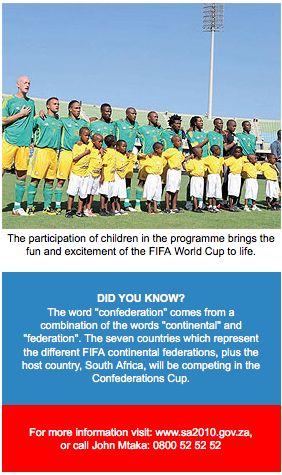 escorts they will walk onto the field with the champions of each confederation team.
escorts they will walk onto the field with the champions of each confederation team.
Single mother
Gwala is a single mother of four and lives in Jika Joe Informal Settlement in KwaZulu-Natal. She used to rely on the child support grant for her youngest child to feed her family. But the Siyazenzela project changed her life. "Since I started working on the project, I don't have to worry about where my next meal will come from," she said.
The boys and girls chosen to be escorts are part of FIFA's Player 's Escort Programme. They will walk onto the soccer field hand in hand with soccer heroes, watched by millions of people around the world.
The children were chosen from a national competition organised by a well-known restaurant chain. To participate in the programme the children had to be between six and ten years old. They had to write one page about why they believed they should be chosen as player escorts.
Ambassador
Only South African children have been chosen to be Player Escorts during the 2009 Confederations Cup. In June last year, South African national team mid fielder, Teko Modise, was named as the official 2010 FIFA World Cup Escort Programme Ambassador.
Modise's role as ambassador took him to different stores of the restaurant chain to promote the 2009 Confederations Cup and the 2010 World Cup. The first group of children who were chosen appeared in the friendly match between South Africa and Norway in March this year.
The friendly match marked the official opening of the Royal Bafokeng Sport Palace stadium in Rustenburg. It was the first completed soccer venue for the Confederations Cup.
Fun and excitement
Modise said working with children in the Player Escort programme gave him an opportunity to share his passion for soccer with children. It also helped him to give back to the community.
The participation of children in the programme brings the fun and excitement of the FIFA World Cup to life.
Win in Africa with Africa
The "Win in Africa with Africa" Player Escort Programme marks the first FIFA world event to be held in Africa.
During the 2010 World Cup finals, 1 408 children from around the world will be escorting players onto the pitch.
The South African children chosen to be player escorts will travel to the soccer matches with parents and guardians. Children from other countries will be flown to South Africa. Air fares and accommodation costs will be paid by the restaurant chain sponsoring the programme together with FIFA.
- Mbulelo Baloyi
WE ARE WAITING TO SHOW THE WORLD OUR BEAUTIFUL COUNTRY
WE ARE WAITING TO SHOW THE WORLD OUR BEAUTIFUL COUNTRY sadmin"Viva South Africa!"
Excitement is rising and soccer fever is taking hold of South Africans like never before. The Confederations Cup is on our doorstep and the 2010 World Cup is just around the corner. Vuk'uzenzele took to the streets and asked ordinary people to speak their minds about South Africa hosting these two important soccer tournaments...
"All South Africans should participate and work together to make these events successful."
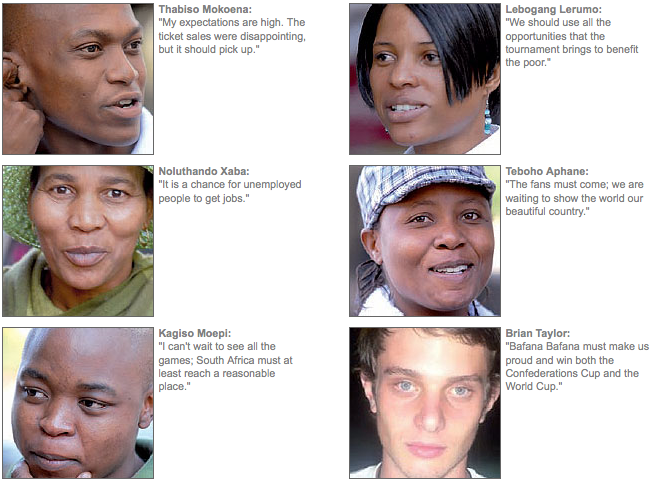
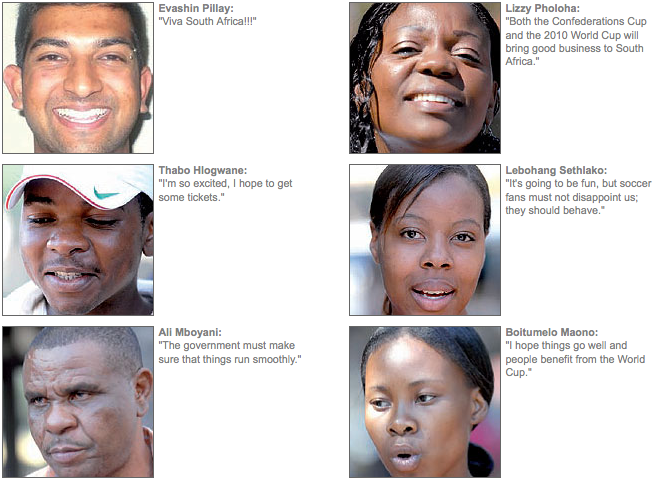
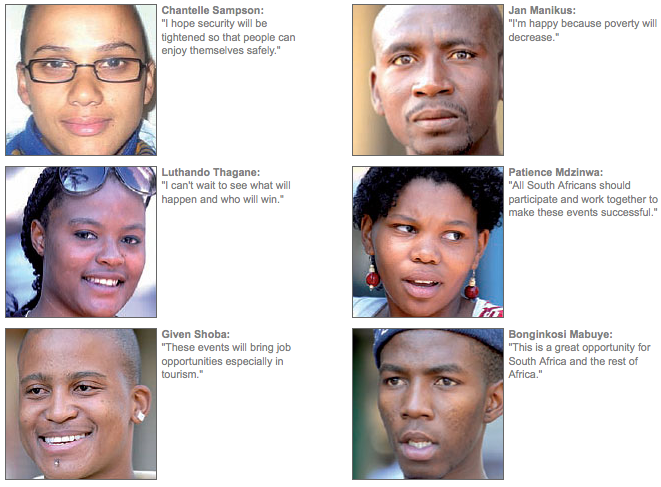
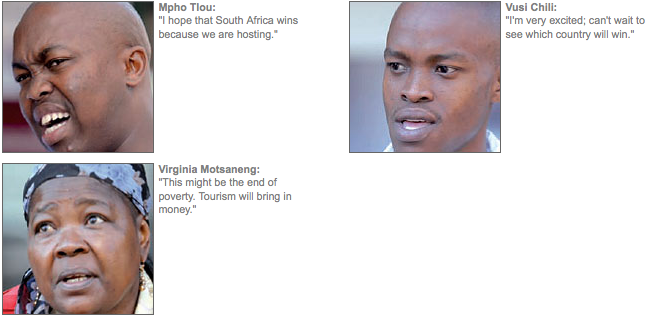
WORLD ECONOMIC CRISIS: WHAT IT MEANS FOR SOUTH AFRICA
WORLD ECONOMIC CRISIS: WHAT IT MEANS FOR SOUTH AFRICA sadminDuring the past months, we heard a lot about the world-wide economic crisis. It is also called an economic recession or slowdown. For the first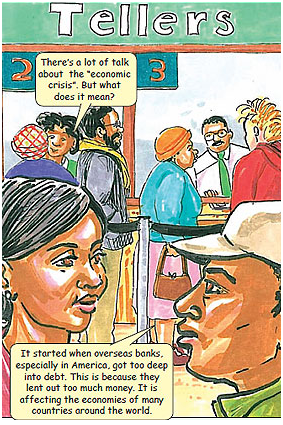 time in about 75 years the world's economy is expected to grow smaller. There are different causes for this. The main cause is governments, households and businesses getting too deep into debt.
time in about 75 years the world's economy is expected to grow smaller. There are different causes for this. The main cause is governments, households and businesses getting too deep into debt.
The economic crisis started in America. Banks and insurance companies in that country lent out more money than they could afford. They also gave too much credit, for example home loans, to people who couldn't afford to pay it back. The result is that these institutions had to cut down on giving credit.
When households and companies cannot get credit, economies start to slow down. This is because people start spending less money. For example, if you want to buy a car and you cannot get credit from the bank, you will do without a car or buy a cheaper car.
South Africa
When there is an economic slowdown in a major economy like America, the rest of the world is also affected.
This is because most countries trade goods with each other through imports and exports. South Africa exports a wide range of goods to places like America, Europe, Japan and China. These include things like gold, platinum, iron, steel, coal and agricultural products. We import things like car parts, electronics, plastics and oil.
This means South Africa's economy is also affected by the economic slowdown. But our sound economic policies have helped the country to be less affected than some.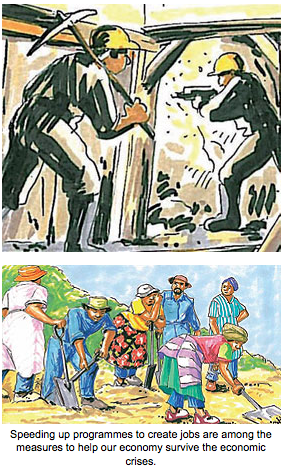
Unlike the American banks, our banks didn't lend out too much money. Our new National Credit Act also prevented credit givers from giving credit to people who could not afford to pay it back.
Less demand
However, our economy is affected because there is less demand for the goods and minerals which we export. If, for example, fewer people are buying fewer cars in America, the factories making the components in China will close down.
This will mean orders for goods from South Africa, like platinum, which is used in car manufacturing, will be cancelled or reduced. If the mine which produces platinum gets fewer orders, it will have to retrench workers.
We are therefore likely to feel the effects through rising unemployment, especially in sectors like mining and manufacturing.
Furthermore, when the economy slows, government gets less income from tax. This means the country will have to borrow more money from other countries.
Steps
Many countries have taken steps to help them cope with the economic crises. Among these steps are reducing interest rates, reducing taxes and increasing employment.
In South Africa, measures to help the economy survive the crisis include:
-
speeding up programmes, like building roads and bridges
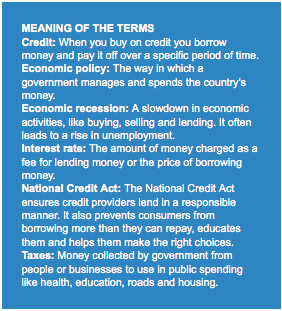
- expanding our social grants system
- increasing spending on the Expanded Public Works Programme, as well as other public programmes to create jobs
- improving unemployment insurance benefits.
Our government has also taken steps to reduce its spending in some areas.
Recover
The world's economy is expected to start recovering by the end of this year or early 2010. South Africa's economy should also start recovering this year. This is due to things like lower interest rates, programmes to create jobs and the effect of the 2010 FIFA World Cup.
- National Treasury
What you can do to survive the economic crises
- Pay off your debt as soon as possible. If you can't pay the full monthly instalments, talk to your debtors to work out a payment plan or go to a debt counsellor for advice (see page 28).
- Once you've paid off your debts, put away some money for emergencies.
- Work out a monthly budget and buy only what you really need.
- Look out for bargains and specials when shopping.
- Join up with family or friends to buy food in bulk (large packs) and share the costs. Buying in bulk every month is cheaper than buying small amounts every week.
- Start you own vegetable garden or start a community vegetable garden and share with others.
-
Some people get together in stokvels and societies to share the burden of the cost of living.
YOUTH CALLED TO JOIN THE DEFENCE FORCE
YOUTH CALLED TO JOIN THE DEFENCE FORCE sadmin The Department of Defence is looking for young people to join them. Through the Military Skills Development System (MSDS), the department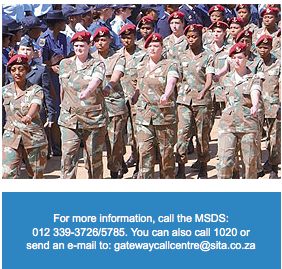 wants to ensure that the youth benefit from career opportunities in the Defence Force. The system is targeting South African youth who got good marks at school, but cannot afford further studies. They also target young people who have completed their studies, but cannot find jobs.
wants to ensure that the youth benefit from career opportunities in the Defence Force. The system is targeting South African youth who got good marks at school, but cannot afford further studies. They also target young people who have completed their studies, but cannot find jobs.
Scarce skills professions
The Skills Development System is doing a nation-wide marketing tour. The aim is to attract talented young people into the scarce skills professions in the Defence Force. These include pilots, engineers, professional health workers, naval combat officers, airspace controllers and technicians
They will recruit matriculants who are younger than 22 years. People who have completed university degrees or diplomas and are younger than 26 years are also welcome to apply for the jobs. Youth who want to apply are advised to attend the recruitment tours in their areas. To be considered, you must have certified copies of the following documents:
- identity document (ID)
- matric certificate
- university degree or diploma (if you are a graduate).
A head start
The recruitment drive is part of a plan to get new skills into the Defence Force. At the same time it is giving the youth of the country a head start in life by providing them with opportunities.
Since 2003, the SANDF has recruited and trained over 23 000 youths, of whom 12 000 have been appointed in the regular services. More than 5 000 jobs are also available in the reserve service.
YOUTH COMMISSION AND UMSOBOMVU BECOME ONE
YOUTH COMMISSION AND UMSOBOMVU BECOME ONE sadminA new youth agency, which aims to respond more effectively to the needs of our youth, will be launched in June this year. The agency will be 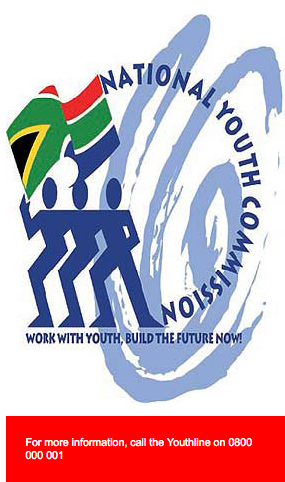 called the National Youth Development Agency (NYDA). It will be formed when the National Youth Commission (NYC) and the Umsobomvu Youth Fund (UYF) join forces to become one united organisation.
called the National Youth Development Agency (NYDA). It will be formed when the National Youth Commission (NYC) and the Umsobomvu Youth Fund (UYF) join forces to become one united organisation.
The aim of joining the two institutions is to make them more effective in supporting South Africa's youth. This is part of government's efforts to strengthen youth development in the country.
Common goal
The new agency will co-ordinate the work done by different youth development programmes. These include programmes undertaken by different role players in the youth development sector and in government.
This will help the different programmes to work together towards a common goal.
Youth Development Agency
The National Youth Commission was started in line with the NYC Act, Act 19 of 1996. Its aim was to support and promote youth development in the country.
The Umsobomvu Youth Fund is a Section 21 Company started by government to address unemployment and economic challenges facing the country's youth. As one united organisation, they will be in a stronger position to deal more effectively with the challenges facing our youth.